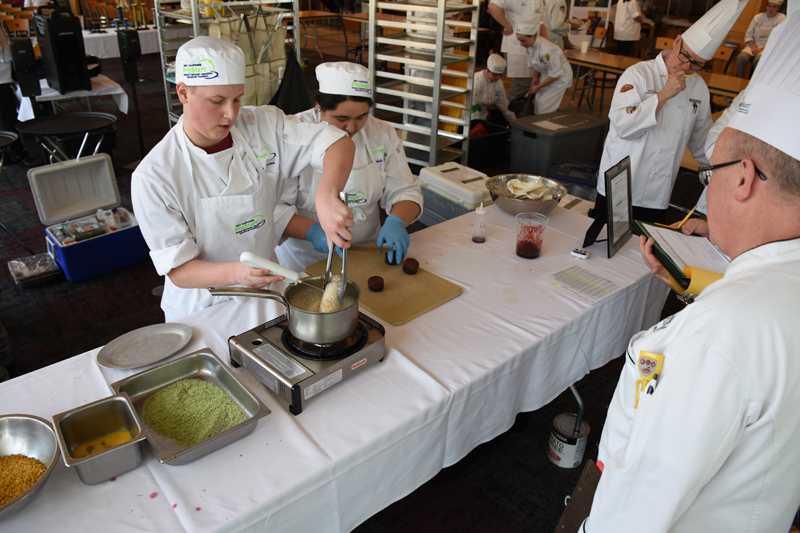
Mar 21, 2017 | Article, Uncategorized
Braving blustery elements at the University of New Hampshire on March 11, several dozen students from 7 high schools came together to compete at the NH State ProStart Competition. The stakes were high, as the winner represents the state at the National ProStart Competition in South Carolina in April, while individuals on each of the top three teams win scholarships.
Scholarships were provided by Culinary Institute of America, Culinary Institute of Virginia, Johnson & Wales University, Louisiana Culinary Institute, New England Culinary Institute, and The Art Institute. Sponsorships by were provided by FeedNH.org, High Liner Foods, EcoLab, Kittredge Foodservice Equipment & Supplies, Performance Foodservice- NorthCenter, and UNH.
Pinkerton Academy fielded two teams with Team 2 winning the competition, which thrilled Pinkerton Instructor, Chef Mark Cahill.
“First place in this very competitive competition has eluded us for several years now,” he explained. “We have a good balance now with my partner Keith, a new CTE Director, and some of the best students I have had the honor and pleasure of leading through this exciting and rewarding time in their lives. Through their strength, determination, and dedication we have all become champions.”
Citing his students’ attention to every detail–right to “the bitter end”–as instrumental, he congratulated every team that competed.
“Congratulations to all of the culinary teams involved,” he added. “Each and every one of them did a phenomenal job on Saturday.”
In addition to Pinkerton, other teams involved at the competition included Concord Regional Technical Center, Creteau Regional Technology Center, Milford High School & Applied Technology Center, Mount Washington Valley Career & Technical Center, Plymouth Applied Technology Center, and Portsmouth High School.
Results
Winner- Pinkerton Academy
2nd Place- Mount Washington Valley Career & Technical Center
3rd Place- Concord Regional Technology Center
Mike Somers, President and CEO of the New Hampshire Lodging & Restaurant Association, said this year’s competition was incredibly competitive with just 10 points separating the first and last place team.
“Every school came with focus, purpose, and a cheering squad,” he said. “We had approximately 100 people in attendance, which is an awesome turn out for NH ProStart. The New Hampshire Lodging & Restaurant Association Education Foundation is so proud of the students and their teachers. All of the teams put forth an incredible amount of effort leading up to and during the competition. We wish Pinkerton Academy the best of luck at Nationals.”
To learn more about the NHLRA, visit https://www.nhlra.com.

Mar 7, 2017 | Article, Culinary Arts
On March 11 at the University of New Hampshire, 7 high school teams will compete at the NH State ProStart Competition with the opportunity to represent NH at the National ProStart Competition in South Carolina in April.
At the state competition, participating teams will demonstrate their respective creative abilities through the preparation of a three-course meal in 60 minutes with just two butane burners and without any access to running water or electricity.
“It’s pretty intense—it’s wonderful to watch,” said Chef Gary Sheldon, who started ProStart competitions in both Maine and New Hampshire.
Currently in charge of ensuring all participating schools adhere to ProStart guidelines he helped develop, Sheldon said successful completion of the program positions graduates for long-term success in the industry.
“In the competitions, the students must do a cost analysis on their recipes and work with others as an actual team,” he noted. “That’s what I love about ProStart—it’s what real life is all about. Students also earn ‘passports’ after completing ProStart, which gets them scholarship money to any post-secondary school in the country.”
Education Programs Coordinator at the New Hampshire Lodging & Restaurant Association (NHLRA), Amie Pariseau said ProStart can have a tremendous impact on students and on their future employment in the lodging and restaurant industries.
“While celebrating the competition and our hard-working students, we hope to showcase that culinary is a fun, lifelong potential vocation and bring awareness to the educational opportunities available,” she said.
For Robert Mcintosh, instructor in the Culinary Arts with Baking at Concord Regional Technical Center, the experiences offered within CTE programming helps build soft skills that are necessary to succeed in business and in life.
“Teamwork, communication, and professionalism all help prepare a student to be successful in the workplace and are part of teaching any trade,” he said. “What most students start to understand is how much of an integral part they play in day to day life as well. Not all my students stay in the culinary field, but all the ones that stay in touch talk about how the soft skills they learned in a CTE class helped them talk to bosses, professors and how comfortable they are working with people in their field.”
Instructor in the culinary program at Portsmouth Career Technical Center, Chef Perrin Long said this year represents his team’s fourth time at the NH State ProStart Competition. His team made it to the nationals in both 2014 (Minneapolis) and 2015 (Disney-Anaheim), although he acknowledged they ran into some issues last year.
“Our menu was too aggressive and we did not place,” he said. “This year, the students have designed their own menu and the ‘buy in’ they have in the process is tremendous.”
Echoing sentiments express by Sheldon, he said competitions like ProStart help strengthen and build students’ abilities.
“Students that compete are typically much more advanced than their counterparts because of the exposure they have had during practices, critiques and the competition,” he said.
According to Pariseau, her role is to try and build and strengthen relationships with—and between—both school districts and hotel/restaurant industry professionals.
“We are trying to build the next big thing for students in this industry,” she said. “We also strongly believe in ProStart and other education programs out there and the impact they have on students and their ability to enter the workforce.”
Expressing enthusiasm for the upcoming state competition, Sheldon said the demand in industry for individuals who have completed ProStart and CTE culinary programs has never been greater.
“I get calls all the time from people in industry looking for skilled help,” he said. “Students in ProStart are developing professional skills so they can walk into any restaurant and they are not lost. These kids are the industry’s future…I’ll take a ProStart kid over any journeyman cook who has been in the field for 15 years.”

Feb 27, 2017 | Article
As part of its 65 by 25 initiative, which seeks to ensure that 65 percent of adults 25 and older in New Hampshire will have some form of post-secondary education by 2025, the Community College System of NH (CCSNH) is launching two interrelated initiatives. Known as Purpose First and 15 to Finish, these initiatives will serve as the focus of an upcoming summit at NHTI in Concord on March 24.
According to Beth Doiron, Director of College Access and DoE Programs and Initiatives at CCSNH, both initiatives are also part of Complete College America, which is charged to increase the completion rate of college students.
“We are working to increase college completion rates, which has been done in other states that have adopted 15 to Finish and Purpose First,” she said.
Doiron said Cape Cod Community College, for instance, has seen impressive results since implementing both initiatives in the 15-16 school year. She cited several statistics as proof, which include the following:
Graduates
2014-2015: 585
2015-2016: 671
Students enrolled in 15+ credits
Fall 2014: 7%
Fall 2015: 8%
Fall 2016 (as of 6/17/16): 13%
With the state’s colleges invited to attend, the Summit will also welcome high school administrators and counselors. Doiron said she hopes the Summit can outline CCSNH’s work with the Complete College America Guided Pathways Initiative in the past year and how high school administrators and counselors can incorporate it at the high school level.
“We want to help students more easily identify pathways to degrees,” she added. “That’s why we are working towards reducing the number of credits needed for degree program completion to 60 so students will be better able to complete their degrees within two years…We have identified 7 major academic focus areas that will help students narrow their program selection and also assist with program completion. All of these efforts will contribute to increased college completion rates.”
Purpose First
According to Doiron, Purpose First seeks the widespread adoption by public postsecondary institutions of strategies and practices to help all students better discern their purpose in college.
“It’s a strategy designed to help students explore their after-college goals and choices earlier in their postsecondary experience,” she said. “Students are coming into college today unsure of what program path to take—we want to actively support students to build deeper awareness of purpose as they progress through school.”
15 to Finish
Through 15 to Finish, students will be actively encouraged to take a full credit load of 15 credits each semester.
“Most students are not taking the credits needed to graduate on time,” said Doiron. “If we can help students on a pathway right when they enter the college system and take a minimum of 15 credits per semester, it will go a long way toward ensuring they can earn their degree or certificate on time.”
65 by 25
Expressing optimism at Summit’s potential to bring a wide variety of stakeholders together for a common purpose, Doiron said the event underscores the very real need to advance 65 by 25. According to researchers at Georgetown’s Center on Education and the Workforce, 68 percent of jobs in New Hampshire will require educational attainment beyond high school by 2020. Present research, however, indicates that far less than 68 percent of New Hampshire’s workforce will reach that educational threshold, which is why CCSNH introduced 65 by 25.
“Our goal is to help ensure that 65 percent of adults 25 and older in the state will have some form of post-secondary education by 2025,” Doiron said. Purpose First, 15 to Finish and Guided Pathways are all designed to achieve this goal and position New Hampshire to support a stronger future economy.”
The CCSNH Purpose First and 15 to Finish Summit will take place on March 24 from 8:30 am to 3:00 pm. To learn more about the Summit, contact Doiron at bdoiron@ccsnh.edu. To learn more about CCSNH, visit www.ccsnh.edu.

Feb 20, 2017 | Article
According to findings from the NH Governor’s Task Force on K-12 STEM Education, the need for STEM programming has never been greater. These findings reveal that while employment opportunities in STEM-related jobs are growing in NH, there are not enough skilled employees to fill them.
Recognizing the need in the classroom and industry, Diane Canada, Career Technical Education Director at Portsmouth Career Technical Center, said they have recently forged powerful relationships with outside agencies to enhance their STEM curriculum.
“We have been fortunate to have Meg Prescott, Great Bay Community College IT Department Chair, teaching our computer science pathway courses as a pilot here in the Career Technical Center,” she said. “This arrangement with the college has been an extremely beneficial collaboration.”
More recently, she said they have provided space for New Heights, an experiential learning organization, to provide robotics programming after school for students through FIRST Robotics Competitions (team name is “The Wire Clippers”). She said the success of this arrangement—as well as a chance encounter with New Heights’ STEM coordinator Wayne Moulton—will yield a deeper collaboration.
“We happened to be at a competition where we were both judges and we got to talking about robotics, STEM and working together more at the high school,” she said. “I was very excited that New Heights was interested in expanding their work into the high school.”
In working to strengthen the educational opportunities for students through the collaboration, Canada said they plan to bring New Heights staff into the classroom during the school day to enhance the programming curriculum with robotics beginning in school year 2017/18.
“It’s an opportunity to build an even stronger programming curriculum as we seek to implement a two-year program in the Career Technical Center next year,” she said.
She expressed particular excitement regarding the opportunity for students to work with New Heights’ humanoid NAO robot.
“I saw a demonstration of it and I immediately recognized its applicability here,” she said.
NAO is humanoid with two arms, two legs, eyes, and ears. It can walk and talk and its artificial intelligence and developed behaviors evolve during the programming process. At a cost of more than 150 million dollars to develop, NAO’s effectiveness as a STEM teaching tool across all academic subjects has been substantiated by evidence in the US, Canada and Europe.
NAO would help students understand how various robotic technologies operate and why they work. It would invite students to problem solve, analyze and apply their knowledge in other settings, which is a cornerstone of Career and Technical Education (CTE).
For Moulton, the opportunity to work with students during the school day helps address a critical educational need.
“Students need hands-on opportunities to apply what they learn in the classroom into situations that are similar to the real world,” he said. “We really enjoy working with the students at Portsmouth High School and can’t wait till the next academic school year to expand our STEM offerings…I’m very grateful for all the staff who have shown their support.”
In looking to work with more students during the day at school, New Heights Executive Director Tracey Tucker said they are building “a STEM pipeline.”
“We are looking to work with elementary kids, too, in the Portsmouth School District,” she said. “I’m grateful for Diane and everyone in the District who are working with us to make this happen.”
Canada also expressed excitement at what lies ahead for students in Portsmouth.
“With Wayne as our robotics maker-in-residence, students will program robots using both Python and JAVA as computing languages to make the robot work,” she said. “Students will also be eligible to earn college credit from Great Bay Community College through Running Start.”
She said it is already obvious that students are eager to learn programming languages to program a robot to do any number of tasks. In looking ahead toward the future, she cited big goals.
“We have a vision of a space where students will be able to design, build, and program all types of robots and mechanisms to better understand computer science, machinery and manufacturing,” she said. “By working collaboratively, we are better able to teach the skills today that industry will need tomorrow.”
To learn more about New Heights, visit www.newheightsonline.org.
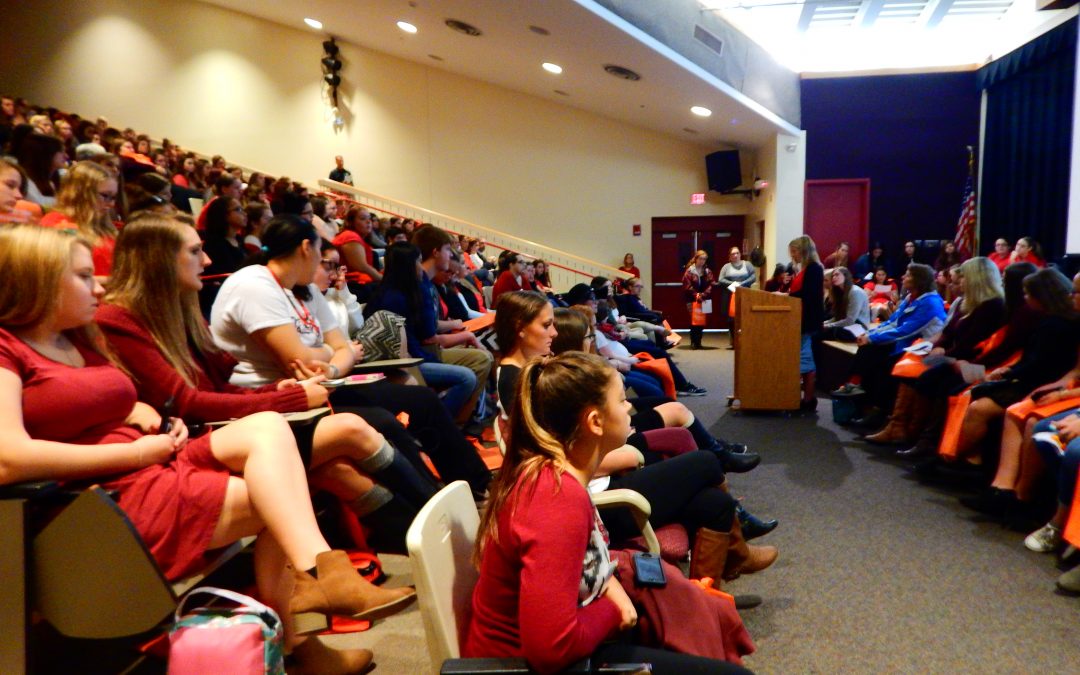
Feb 7, 2017 | Article
In October of last year, Educators Rising NH hosted its first fall TEACHERFEST on the campus of NHTI- Concord’s Community College as a way to expose students to NH colleges that offer degrees in education. Designed as a professional development day for high school students who attend CTE Teacher Education programs throughout the state, TEACHERFEST consisted of various mini-workshops on professional topics related to careers in education, curriculum areas, and teaching methods.
Noting approximately 350 Teacher Education students and teacher leaders from nine NH CTE centers were in attendance, Concord Regional Technical Center’s Valerie Koch, who helped organize it, said TEACHERFEST underscores a real need.
“Over 60% of teachers teach within 20 miles of where they went to high school,” she said. “We believe these future teachers understand the unique needs of our community and will be committed to serving children in their own region. We are hoping that Educators Rising NH will help to create a pipeline of quality teachers who earn degrees in our state and then stay in NH to teach and positively impact students and schools.”
Educators Rising NH is a organization that supports high school students who are interested in pursuing a career in the field of education. Educators Rising NH was officially approved by the NH Department of Education in June 2016 as a Career and Technical Student Organization (CTSO) and is an affiliate of the national organization, Educators Rising.
Sue Bergman, who coordinates the effort statewide for Educators Rising NH, said she wants students and teachers alike to know there is support for them. Our organization and website offer a ton of resources,” she said. “Educators Rising might be new in NH, but it is a terrific national organization…We want to continue to grow our membership here in NH.”
At TEACHERFEST, nine NH colleges and universities that offer degrees in Education were in attendance, while thirteen education professionals from throughout the state led thirty minute workshops on various topics. These topics ranged from Occupational Therapy, planning for college success, and effective parent communication to STEM education, connecting with students and more.
Other activities included voting for state officers, a selfie photo booth, a graffiti wall answering the question “What excites you most about becoming an educator?”, and “Education Rocks!” where students Zentangled™ (doodled) designs and words of inspiration on a rock to take home.
The event concluded with donated raffle prizes, students sharing their experience attending the National Conference in Boston last June, and the announcement of the first Educators Rising NH state officers. These offers are Laura Seymour (CRTC)- President, Jennika Mannesto (CRTC)- Vice President, Megan Coelho (PA)- Recording Secretary, and Emily Aham (PA) and Abigail Beaudoin (PA)- Public Relations Secretaries.
One of the highlights of the event, according to Bergman, was the keynote address by Ashley Preston, who was 2016 NH Teacher of the Year.
“We wanted her to speak at TEACHERFEST about why she is doing what she is doing,” she said. “We are losing good quality people in this state.”
For Preston, who is a preschool teacher at Parker Varney School in Manchester, NH, there is no career more rewarding–or perhaps overlooked–than as a preschool teacher.
“The biggest challenge I face as a preschool teacher is the lack of understanding about the value of early childhood education as well as what appropriate early learning actually looks like,” she said. “There is ample research on brain development that supports the importance of high quality early learning experiences. We need to provide these experiences and early academic support for our youngest students when their brains are naturally inclined to learn and grow so they are prepared for future success in school.”
Preston said the other challenge she faces as a preschool teachers is the lack of understanding by many as to what constitutes “a valid learning experience” for young children.
“Many see it as meaningless play and teachers are seen as glorified babysitters,” she said. “Preschool students should be playing because that is how they are learning,”
According to Preston, well-trained preschool teachers are able to use structured and unstructured play as learning tools to teach literacy, math, social skills, collaboration, language, and much more.
“Seeing play as invalid learning supports the idea that preschool is not important, which creates this negative perception for us to overcome,” she said.
In speaking on the experience of teaching and why it is so important for her, Preston said the students do more for her than she could ever possibly do for them. She referred to her students as “builders, creators, artists and more.”
“They make me laugh and sometimes they make me cry, but they never stop amazing me,” she said. “The things they can do, their ability to work and learn together despite their challenges or differences, it gives me hope every day.”
To learn more about Educators Rising NH, visit https://www.educatorsrising.org.

Jan 27, 2017 | Tid Bits
Today’s Association for Career and Technical Education Smartbrief included an article discussing competency-based education in New Hampshire. “A school in New Hampshire, where academics support career and technical courses, has adopted a competency-based system in which students work at their own pace. In this commentary, principal Karen Hannigan Machado shares the pros and cons of the approach.”
link to ACTE SmartBrief and full article

Jan 13, 2017 | Building & Construction Trades, Tid Bits
Four CTE centers in New Hampshire are joining the tiny house movement. Tiny House New Hampshire is a workforce development program designed to encourage students from career technical centers to consider the construction trades industry. Four schools around the state are taking part in the program. The other schools are Huot Technical Center in the Lakes Region, Kennett High School in North Conway and Alvirne High School in Hudson. The houses will compete against each other in March.
full Seacoast Online article
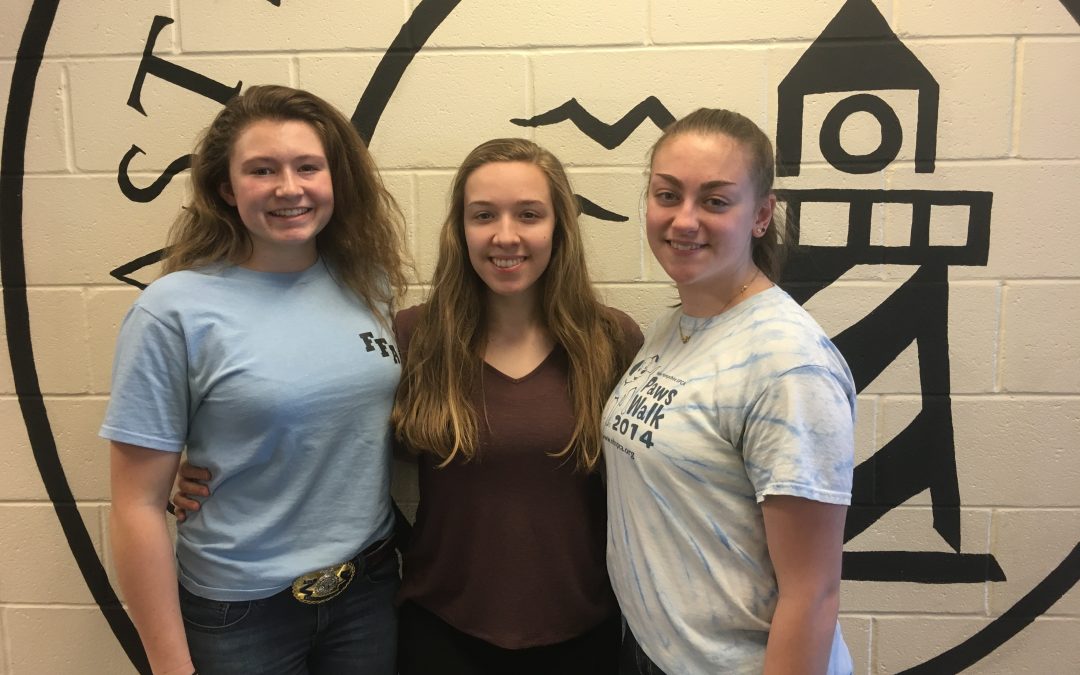
Dec 22, 2016 | Article
With more than 60 enrolled students, Seacoast School of Technology’s Animal & Plant Science program recently saw three of its own—seniors Jalin Marston, Rebecca Bernier and Madelyn Bentz—achieve success at the national level. Competing in October at the National FFA Convention & Expo in Indianapolis, Marston secured a gold while Bernier and Bentz grabbed a silver and bronze, respectively.
Instructor Anne Demarco said she could not be more proud of their accomplishments. “The girls learned a lot—it was an eye-opening experience for them,” she said. “They did outstanding.”
The students qualified for the national competition after winning at the state level with a project in aquaponics where they grew plants by using fish waste in a re-circulating system. At the national convention, students were presented with written tests and asked to participate in a mock press conference about their project with each student fulfilling a particular role. They also presented in front of a panel of national judges with a project proposal that was submitted in August.
“Our job was to focus on one area for the competition, which was agricultural communication, so it involved marketing and journalism,” said Marston. “The purpose was to communicate about an innovative practice to the surrounding communities.”
Demarco said their performance was even more incredible given the fact the students had only worked together for one year. Whereas the programs at SST are two years, she said those of other states are 4 or 6 years. Some CTE programs in NH offer up to 4 years of instruction as well. “Other kids around the country get to specialize where we provide a little bit of everything in our program,” she added.
Noting one relatively new addition to her program is sustainable agriculture, Demarco said there are a number of skills her students are developing in addition to technical knowledge.
“They are definitely learning team work, time management and working under deadlines,” she said. “They are learning perseverance and networking, problem solving. They are also learning to be courteous and respectful, as we send them to other professionals when they are doing research. The students learn a lot of important skills that will transfer across many areas.”
As for the experience at the National FFA Convention & Expo itself, Bentz said they were “really proud” of themselves. She said the takeaway from her participation at the event national convention was that she is not alone in her ambitions. “It was great to see so many students with such passion for agriculture,” she said. “All across the country, there are teenagers who want to make a difference.”
Noting there were substantial expenses incurred to make the trip to the national convention, Bernier said it was worth it. She cited a private donation from the Pomona (5th Degree) Grange for the area East Rockingham Pomona as instrumental in their ability to also enjoy themselves outside of the competition. “We went to a rodeo and concerts—it was a lot of fun,” she said.
According to all three students, Seacoast School of Technology’s Animal & Plant Science program has been a great experience. They each also expressed gratitude at the additional opportunity to participate in the National FFA Organization.
Referring to it as “a family,” Bentz said FFA provides leadership and professional opportunities. “Whenever you wear one of these iconic FFA blue corduroy jackets, the feeling is indescribable,” she said.
Bernier agreed and added, “All of the jackets on the back have the state you are from and the chapter you are in and an emblem that signifies that everyone is together. We are all potentially a family. We respect each other and we are part of the same organization.”
In summing up what she hopes all students ultimately take from Seacoast School of Technology’s Animal & Plant Science program, Demarco cited a “belief” they can solve anything.
“These kids are capable of thinking outside the box with the skills they have developed here,” she said. “I hope they have also developed an appreciation for the huge field of agriculture—it ties into everything and every industry….Whether we are feeding the world, saving the environment, or helping someone’s pet, our field makes the world a better place.”
Photo Credit:
Left to Right: Jalin Marston, Madelyn Bentz and Rebecca Bernier
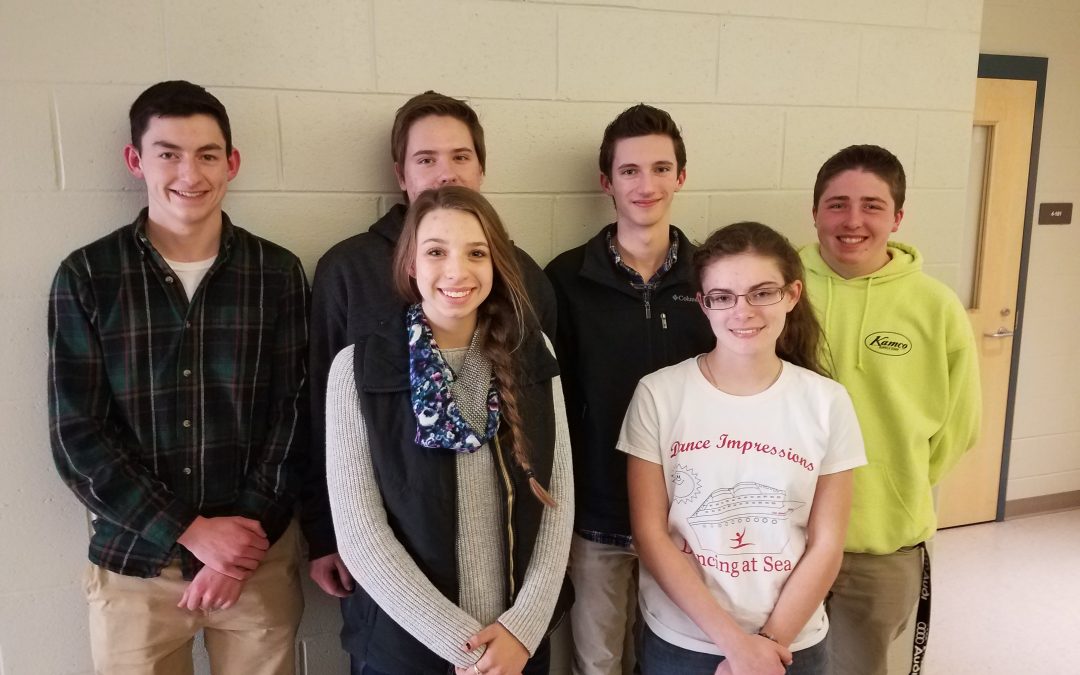
Dec 22, 2016 | Article
While the existence of robots still seems like science fiction for many parents, today’s students are actively programming and working with them in anticipation of entering an increasingly technology-oriented workplace. Recently, 6 teams from Pinkerton Academy VEX Robotics program tried their hand at designing and programming a robot at Pembroke Academy’s Winter Classic Robotics Competition on Saturday December 3rd.
“Five teams made it to the quarterfinals round and two to the semifinals,” noted Engineering Instructor, and VEX Robotics Advisor Ernie Biron.
Team 241A, however, distinguished itself even further by winning the Design Award for their robot and documentation, which qualifies them for the Regional Finals in February at Manchester Community College.
For Biron, VEX Robotics is unique in its ability to provide a hands-on way for students to learn STEM and how to problem-solve, while also recognizing “the technological wonders around them.” “It shows them how they can become a part of changing the future of technology,” he added.
According to the students themselves, their participation in the program stems from a tangible desire to prepare for this future. “I like [the program] because it gives you a real world outlet,” said Alex Mielens, captain of Team 241A. “We are all thinking ahead—we want to be engineers.”
Fellow participant Nathan Stallings agreed and added, “I personally joined because I want to be a robotic engineer. I want to expand my education and understand how robots work.”
Biron said he is particularly impressed at how the program also demands that students rigorously document their work.
“Students need to keep a running record of how they came up with the design, issues, flaws, corrections, and the engineering and STEM principles used in completing their robots,” he said. “Teams cannot be considered for Design or Excellence awards unless they have a really good document package.”
In addition to learning how to build a robot that meets a specific challenge, the students themselves noted the program also helps build other skills, including team work. Citing ten students on Team 241A, Senior Mike Estes said it can definitely be a challenge to keep everyone involved in the project.
“It’s hard to give work to everybody,” he said. “Everybody is at different grade levels, too—some are freshmen, others are seniors. We run into issues, but work through them.”
Jessica Lacey, a first-year participant in the program, said working in a group has been “an interesting experience.” She said she has been surprised, however, at how working in a group has enhanced her understanding of robotics.
“I’ve worked with VEX parts before, but by working in larger groups I’ve learned a lot from bouncing my ideas off other people and other teams,” she said. “It’s been a huge learning curve for me, but very interesting.”
For younger students unsure as to whether to get involved in a robotics program, first-year participant Stasia Sturdivant said she suggests they attend a competition, which is what she did for her own younger sister.
“I got my 5th grade sister interested by bringing her here during meeting nights, showing videos and bringing her to competitions,” she said. “I think it would piqué a lot of students’ interest.”
In addition to watching his teams perform at and excel in various competitions, Biron said he also especially enjoys the fact that the program continues to grow. Citing this as his 4th year instructing VEX Robotics students, he said his program has more than doubled in size from his first year.
“When I first started, we had only about 20 kids with maybe 10 to 14 coming in consistently,” he said. “Now, I get over 50 and have to turn down some as the teams are way too large at times to be fun.
He said his personal goal is to try and expand the program into Derry’s elementary and middle schools.
“I hope to add more teams as funds or costs come down, but that’s hard as I use the same components to teach my engineering classes,” he said. “For now, I’m just enjoying the hard work put in by our current teams who are representing Pinkerton Academy proudly.”
Biron said he also takes pride in the accomplishment of a former student. “One of my past students started a college team at UNH last year,” he added. “It’s exciting to see that, too.”
Photo Credit:
Pinkerton Academy Vex Robotics students
l-r front row – Jessica Lacey, Stasia Sturdivant ( both first year robotics students)
l-r back row – Mike Estes, Alex Mielens, Nate Stallings, Austin Caux (all 3-4 year robotics students)
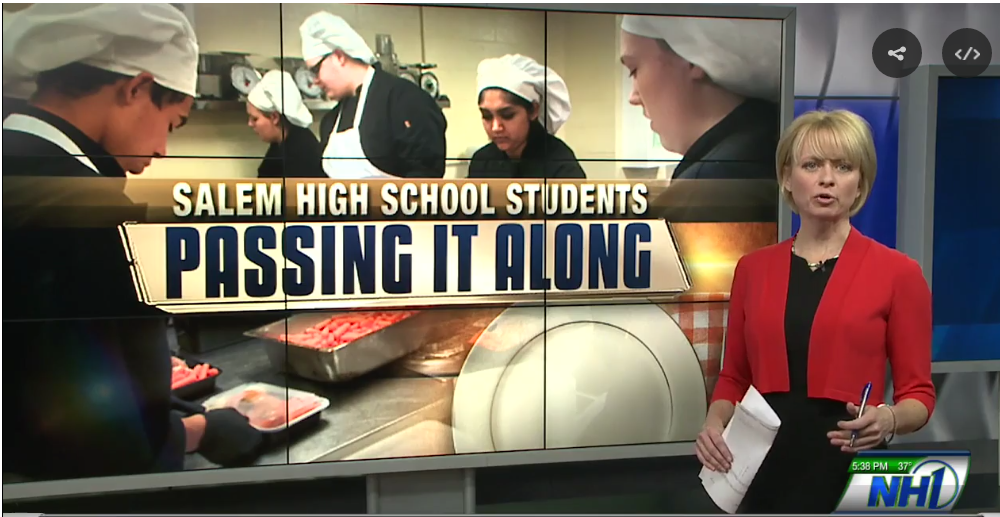
Dec 22, 2016 | Culinary Arts, Hospitality, Tid Bits
Salem High School culinary students are preparing hundreds of meals for those in need around their community. Not only do students gain valuable experience in producing large quantities of food, they help out area food banks and homeless shelters in the process. VH1 recently aired a video highlighting the project linked here.
A Go Fund Me page has been established to raise funds for the program.










